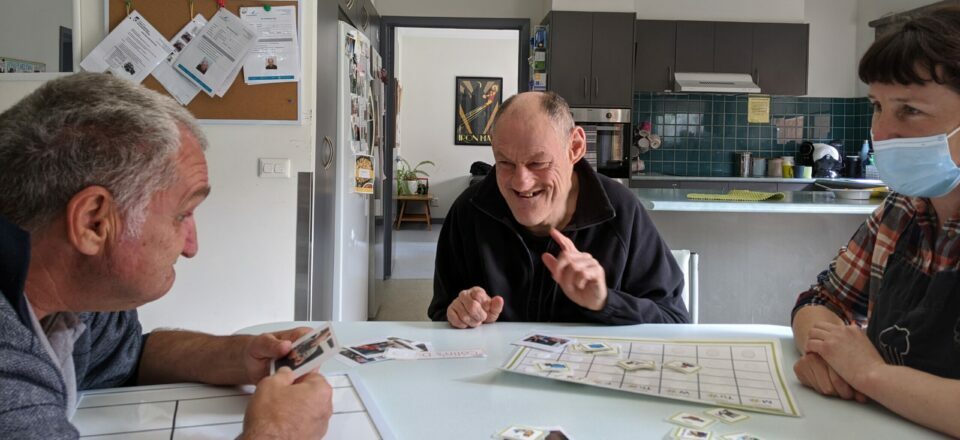How communication aids help housemates build better relationships
If you have complex communication needs and live in a Supported Independent Living (SIL) home, communication aids are a great way to get your message across.

First, a quick recap. If you live in disability accommodation, SIL is paid personal support funded by NDIS.
It doesn’t cover your rent, utilities, food, or other lifestyle choices – but that’s where your Disability Support Pension comes in, along with any other source of income you may have access to.
With careful planning, you should be able to cover most of your living expenses with your disability pension and personal income. If you’re living in a shared accommodation like a Scope SIL home, your expenses should be a little less, as you can divide things like utilities and housekeeping with your housemates.
As part of our service here at Scope, we ensure your rental and boarding expenses are covered by the funds available to you. Let’s take a look at some of these expenses to help you calculate how much you need.
Finding the right place to live is a huge decision. You have to think about everything from the location, to the type of house, to the people you want to live with. With SIL, there are different accommodation choices available – from living in a shared home, to converting your personal or rented home into a supported living area. If you have higher needs, you may be eligible for Specialist Disability Accommodation (SDA); or you may be able to use Individualised Living Options (ILO), which allows you to customise your living space using personal care supports. If you’re not sure what you’d qualify for, we’re always here to help.
Rent costs can vary depending on the type of accommodation you finally decide upon. That said, most people who get SIL funding choose to live in a shared provider accommodation like Scope. You will however, need to make your own arrangements for room furnishing, including bed and linen.
If you go down this path, you would typically use around 25-30% of your disability pension for rent. You may also be eligible for rent assistance from Centrelink.
Household groceries make up the biggest part of your monthly expenses. In a shared home, most housemates love to get together and plan their meals for the week ahead. They also like going out to shop for groceries together. Not only is it a great group activity, but it also helps everyone save money by sharing the grocery expenses.
If you have special dietary requirements, you may need to buy your own items. And, while boarding expenses in a SIL home like Scope cover essential appliances, you may need to arrange for special kitchen equipment if you need it.
Generally, though, you should expect to use around 50% of your pension on food and groceries.
One of the benefits of living with housemates is you get to share the cost of things like electricity, gas, water, internet fees, cleaning, laundry, and common household repairs. These things can become expensive if you’re living on your own.
All Scope homes are equipped with essential household and kitchen appliances. These are typically covered in your rental and boarding charges. However, if you want a television or stereo in your own room, then it’s on you and you’ll need to factor that into your budget!
You will need to set aside an amount each month for medical and pharmacy bills, and any private medical insurance you pay for. Your NDIS plan may cover wheelchair assistance or vehicle modification costs, but you will still need to pay for the fuel or vehicle servicing.
Then there are things like your mobile phone and data packs, and other personal expenses like clothes, music, and personal toiletries. Going to the movies, eating out, and travel will also come out of your own pocket.
Looking at all the above, it might feel like a lot to keep track of. But it’s really not much different from any other person living independently. And in return, you get an opportunity to make new friends, develop life-skills, grow in confidence and live your life the way you choose.
For more details about how to transition to a SIL shared home, speak to the Vacancy Coordination Team or your support coordinator.